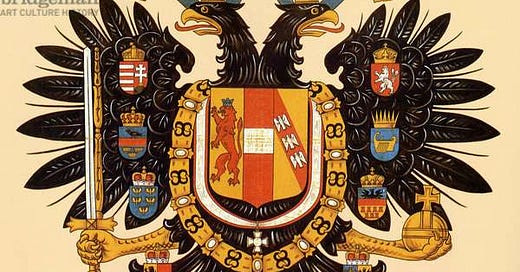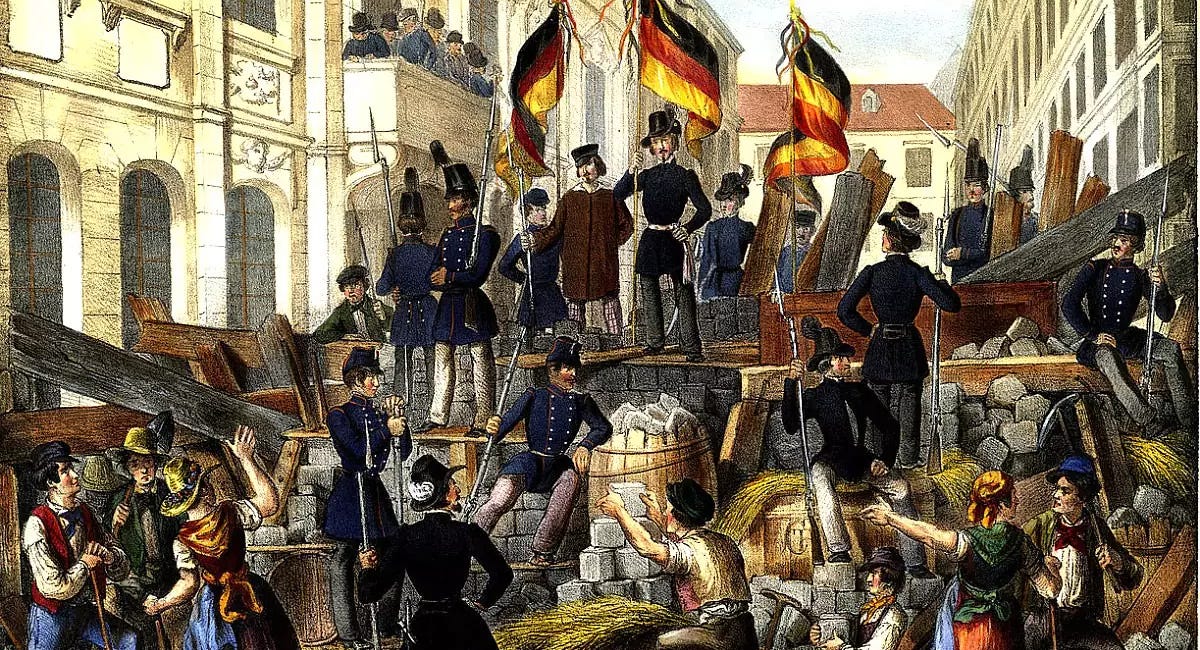From enlightened despotism and bureaucratic centralism to uneven democritization and nationalism
Review of The Habsburg Empire: A New History by Pieter Judson
Judson's aim in this book is to prove that the myriad ethno-linguistic nationalities of the Habsburg Empire did not inevitably pull it apart. This goes against the conventional wisdom. He makes a good case that the monarchy provided a focus to local aspirations as they opposed parochial aristocrats' domination of the local economy and public affairs, a kind of supra-national career opportunity, hence hope for improved circumstances. He further argues that it was the privations of World War I that caused the Empire to explode into fragments, i.e. it was the final proof that the Emperor was unable to keep his side of the bargain. It is an interesting thesis and he partially succeeds.
The story begins with Maria Theresa, the first female heir to the Habsburg throne (even crowned “King” of Hungary). With little training, she proved to be a formidable leader and was steeped in Enlightenment ideas, which she transmitted to her son, Joseph II. Their mission was to wrest local control from aristocrats, whose interests to preserve economic and political control of “their serfs” excluded the adoption of a freer labor market as well as new farming techniques, i.e. barriers to the development of a modern liberal economy. To further his aims, Joseph II created a “revolutionary bureaucracy” of enlightened technocrats, who were supposed to impose his will in the various territories of the Empire. Unfortunately, however visionary he was, Joseph II made too many enemies to realize his radical program, in particular the backward and very powerful notables of Hungary.
Upon Joseph II's untimely death, his successors proved far more conservative and less visionary. They fought against the ideals of the French Revolution and later Napoleon's program, in effect employing the bureaucracy to surveil the populations, impose censorship regimes, and protect the vested interests of local strong men. This reactionary regime, as embodied by the bureaucrat Metternich (a favorite of Henry Kissinger), lasted until the revolutionary convulsion of 1848.
Soon thereafter, Franz Josef became Emperor; though of mediocre intellect and lacking in energy and ideas, he began to carry out many of Joseph II's reforms in a piecemeal and ad hoc fashion, gradually expanding voting rights, freeing peasants to work for a wage rather than under slave-like obligations, and liberalizing the economy, i.e. allowing the rise of entrepreneurs and a merchant middle class. This led to a period of extraordinary growth and mobility of the various ethnic and linguistic groups and religions, according to which social improvements would evolve naturally along with the free-market economy. Cities and factories flourished, alternative life choices emerged as the feudal restrictions were swept away, guarantees to aristocrats diminished if didn't quite disappear. This consensus crashed with the depression of the 1870s, the largest to date. Nonetheless, it was a golden age of intellectual and political ferment.
Judson argues that nationalists did exist, but for the most part nationalism was used as a rabble-rousing tool by politicians whose goals were more mundane, hence it was “situational” rather than structural and based upon democratic idealism or racist preference. I believe he makes a fairly convincing case, in particular because even linguistic groups did not share abstract goals. For example, Czech speakers in Bohemia and Moravia were not united in any desire to establish a nation but wished to remain autonomous from each other within the auspices of the Empire. Needless to say, this generated a plethora of centrifugal forces in the degraded economic situation, all of which the Emperor had to balance and smooth over. Posing as a kind of grandfather, Franz Josef did a fair job at this but by the turn of the century many thought he was a doddering fool.
Once the Great War started, events took on their own dynamic, in particular with food shortages, the slaughter of youth, and craven mismanagement. As a result, nationalist politicians quickly emerged to further their own interests and the breakup of the Empire led to the creation of 3 new states and the emancipation of 4 existing ones as fully sovereign. The borders would be disputed, populations remained chaotically “mixed” in cobbled together states – less than 50% of “Hungarians” spoke the language at the moment of independence – all of which boded ill for the future and played out in the catastrophes that followed the 1920s.
The book is written at a fairly high level, I'd say not for beginners but rather for history buffs and majors at university who already know the general outlines. It also doesn't offer much of a narrative or much coverage of the personalities involved in leadership positions. In addition, the approach is purely political, neglecting culture, fine arts, and the revolutionary developments in social science that were coeval. I wanted a wider picture of how all this fit together and will have to find that elsewhere. Finally, the book ends abruptly, but I suppose it had to end somewhere. Much of it is somewhat dry and academic in tone.
Overall, this is a fascinating and full portrait of a vastly complex, multi-ethnic society as its politics transformed into modernist institutional practices. If Judson proves anything, it is that things did not have to turn out the way they did.
Related review:
Brilliant diplomatic history, with the personalities and context
The conventional view of the Congress of Vienna is that Metternich established a system to balance the great European powers off of one another, achieving a relative peace for decades. At least, that is the argument that Henry Kissinger made and which, he claims, he was trying to recreate under Presidents Nixon and Ford. While this is a fascinating conc…
Review of 1848: Year of Revolution by Mike Rapport
I have long sought a detailed account of 1848: it was a time of myriad movements, crises, hopes, violent revolutions, and even more brutal counter-revolutions. As a moment of such utter complexity and import, it is key to understanding the tensions of the present day. While this uneven book dwells too much on the details of the violence and political ma…
Kulturgeschichte of a cultural and intellectual watershed, fin de siècle Vienna
This is a rich intellectual history of a time when there was an explosion of new ideas in both the arts and sciences. The place was Vienna, at the end of the Habsburg monarchy, where not only Sigmund Freud (psychology) but also Loos (design), Schoenberg (music), Kochoscka (painting), and many others were establishing what we now call "modernism." It is …
Viennese intellectuals, artists and nationalists, with a dash of Freud
It is easier to say what this book is not than what it is: not a narrative history, not an analysis of causes, not even a basic introduction. It lacks clear definitions of the movements it is supposed to cover, such as liberalism, modernism, psychoanalysis, and the birth of mass nationalistic politics. That means that readers will either have to be fami…








